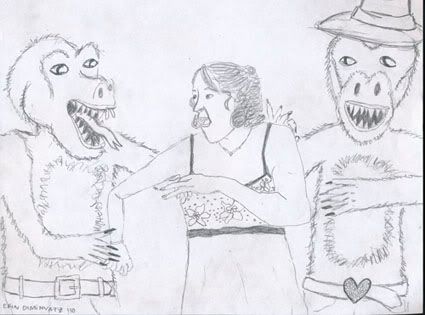
Friday, January 22, 2010
E, S, & I

Thursday, January 21, 2010
Reality Hunger: A Review
1
This review of David Shield's upcoming Reality Huner: A Manifesto will be written in the same style as his book. It will be numbered, fragmented, and will steal shamelessly. It will also (I hope) create a sum greater than it's parts. At least, that's what Reality Hunger manages to do.
2
Many (most?) of the passages in this review are taken from other sources. What a great man quotes, he fills with his own voice and humor, and the whole cyclopaedia of his table talk is presently believed to be his own. So says David Shields. Possibly. Reality Hunger is a buffet of collaged prose, some of it Shields, much of it not. Shields has included some attributions in the back of his book, but he will personally hunt you down if you read them. Let it all blend. It works better that way. Reality-based art doesn't need to apologize.
3
The generic line between fact and fiction is fuzzier than most people find it convenient to admit. Shields prefers that gray area. He makes the case for invention in non-fiction (memory is already an inventive machine; anything processed by memory is a fiction) and cites a tradition of autobiography in “fictitious” works. It's difficult to separate what happened from what seemed to happen. Shields isn't worried that you might fib in non-fiction: he's worried that you may not fib well enough.
4
Statistic: There are 220 words in the English language to describe a sexually promiscuous female, while their male counterparts have only 22. We call one a stud; the other, a slut. Shields presents a similar incongruity in expectations towards fiction and non-. Why do we allow fiction to borrow from fact when we condemn non-fiction from taking artistic liberties? Good nonfiction has to be as carefully shaped as good fiction, and I'm not bothered at all by this artifice.
5
Shields writes about reality TV, hip-hop, and James Frey. Don't be fooled. He's still the star of this show.
6
Part of the fun of Reality Hunger is trying to sift out what belongs to Shields and what doesn't. I think you figure it out (more or less) about halfway through. Toward the end of the book is section “DS,” or, “David Shields.” Most authors introduce themselves and then wander away from ego. Reality Hunger is like hearing choice lines from a lecture echoed in some distant hall. By the time you find the auditorium, you're breathless, you're captivated, and seeing the man behind the podium is eerily rewarding.
7
What does it mean to write about yourself? To what degree can solipsism gain access to the world? It's refreshing to read someone so shamelessly self-involved, so obsessed with his present moment. I have the feeling reading this book that Shields is staring so piercingly into his own mind that I don't see him at all. I see everyone else. I see myself.
8
In Alone, one of the book's last sections, things come together. The discourses, the various inquiries, the unattributed quotes merge into an underlying truth (maybe truth is the wrong term; it's more like a well-deserved punch to the face). We write/read/watch/obsess over the self because it's all we know how to do, and it's something we all we have in common. Personal lyricism is the outcry of prisoner to prisoner from the cell solitary life. In the end, one only experiences oneself.
9
Reality Hunger's other merits: providing a substantial reading list; quoting stand-up comedy; denouncing Oprah; giving the finger to copyright; championing the lyrical essay as today's most important and engaging art form.
10
Reality Hunger is not a book. It looks like a book—it has pages, a front and back cover, blurbs, etc.—but it's not. Reality Hunger is a documentary. A calendar for a 582-day year. A book of proverbs. A spiderweb. A mess of paper scraps and glue. It's a guidebook to reading, writing, watching, stealing, remembering, imagining, and dying. You will experience a shutdown of mental faculties while reading this book, a nearly full-scale wipe of beliefs of conventions. The blank screen. Then, the motor starts whirring and things come back into focus, not quite the same as they were before.
11
If you write, read, watch, think, or otherwise exist, you owe to yourself to read this book.
(For another opinion, check out Mr. Seth Rasmussen's review.)
Wednesday, January 13, 2010
Emailing Creepy Folks on Craigslist: The Gift that Keeps On Giving
"I Slept with Sixteen Different Girls this Week
I have the morals of a SEWER
Why? Because I manipulate
within hours of meeting them .
Craigslist, dating sites like
It's almost as if I slip them
everything - and everyone -
But there is no such drug. In
that you can use starting NOW
Look, I'm talking about some
this isn't ethical, nice, or
HEY! Stop being jealous of
Isn't it time to just say '
While I'm tempted to steal this and turn it into a poem, I suppose I'm more interested in the fact that someone, somewhere, wrote this delightfully crude email, and moreover, that they probably making money doing it. Well god damn. Where do I sign up?
Truth is, I don't know where to sign up, because if I could, I would. I've tried explaining this to friends, and while they usually respond by sucking air through their teeth, changing the subject, or simply looking at their shoes, I stick by my convictions. This dude is probably sitting in his flannel pajama bottoms right now, (can't you see him? there's a bit of mustard crusted to his swollen, uncovered belly), writing these emails in all of three minutes, firing them out, and then letting the insecurities of the internet public get him paid.
At least, that's what I'm inferring from the automated messages that you inevitably end up with when you do any sort of scandalous emailing on the List. Most often, they're not bro-tastic messages like this one, but grammatically-challenged emails penned, supposedly, by real women. And while I'm sure that there are some real women, i.e. prostitutes, sending out some of these messages, for the most part I'm inclined to believe that some dude in Alaska (or wherever) has built a website and posted a bunch of photos of scantily clad 19-year-olds (which he pulled at random from the web). At that point, your clientele's loneliness has done the work: all that's left to do is charge the poor fuckers with the promise of meeting Cindy or Veronica or Miracle, eventually.
Perhaps that's terrible. Maybe this system is feeding on people's weaknesses, and leads only to more hurt, to further estrangement. Perhaps, perhaps.
Personally, I think it's a kick-ass entrepreneurial idea. I've been swimming after that sailed boat for like, 9 months. I usually reply to these emails by asking how much money is to be made doing this sort of work, or how they got started doing it. They don't ever write back. Or maybe they do. Maybe the email that showed up at 1:37 this morning was a long-delayed response to one of my inquiries. Perhaps the writer, that mustard-spattered guru, sensed my desperation through his computer. Maybe he sensed my loneliness. Maybe he was trying to tell me something.
Or maybe he just doesn't give a fuck. He has the morals of a sewer rat, after all.
Tuesday, January 5, 2010
"It falls to the Atom to Observe Itself;" a response to my friend, Seth
to me, to count my fingers,
to inhabit, daily, the flickering candle-flame of "i."
It's why TV medics scream "Stay with me!"
why I slapped my grandmother
when her back broke against the rocks:
To forget oneself is to crumble away at the base of the neck,
a surrender of atoms,
each eternal eye turned in.
(If you all enjoyed this poem, check out Mr. Seth Rasmussen's response here.)
